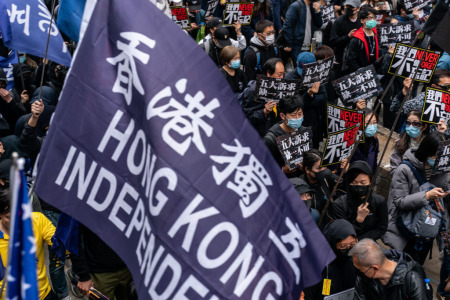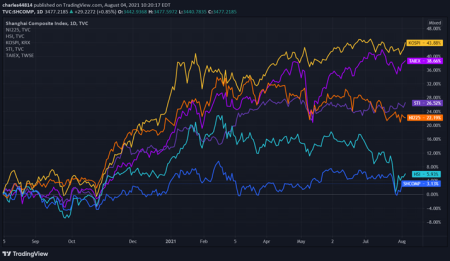Is China's financial crisis a judgement from God?

In the modern media era, we tend not to pay much attention to international affairs, and when we do, it’s generally in search of ammunition to use in domestic political battles. So you might be surprised to hear that China is going through something of a minor financial crisis following a series of sudden and perplexing state interventions in the economy. You would probably not be surprised to hear that the Chinese government is one of the world’s foremost persecutors of the Church.
I don’t believe that’s a coincidence. Back in 2019, we researched the relationship between Christian oppression and political instability. Writing at AsiaTimes, we presented data showing that governments which persecute the Church are disproportionately likely to suffer revolutions, civil wars, and coups. We left the question of cause – whether these regimes collapse because of God’s judgment or simply because of material causes within their political systems – open.
But the pattern is real, and reasserting itself under a slightly different guise in China – a country historically hostile to Christian values, headed by a regime willing to sacrifice its economic well-being in service of an ever-tighter grip on its citizens. China is, of course, not undergoing a civil war, coup, or revolution - but they are persecutors of the Church, and they are massively underperforming their neighbors.
Per the chart below, the domestic stock indices of the major East Asian economies have recently diverged substantially, with the Japanese, Singaporean, Taiwanese, and South Korean benchmark stock indices performing multiple times better than those of China and the formerly autonomous Hong Kong.

South Korea: yellow
Taiwan: light purple
Singapore: dark purple
Japan: orange
Hong Kong: teal
China: blue
The sell-off isn’t limited to stocks; the yuan and Hong Kong dollar also fell, along with their bonds. As the dump of Chinese assets accelerated in recent weeks, both currencies slipped to 3-month lows, indicating a pessimistic attitude among investors about the Chinese economy in general.
Why the disparity between China and its neighbors? Per the Financial Times, the stock, currency, and bond sell off was triggered by
“a regulatory assault on companies that handle large amounts of data and education businesses, as well as an overhaul of how Chinese groups list on stock markets outside the country.”
Financial Times
In fact, the past year has seen a host of wealth-destroying policies come out of Beijing, whereas the likes of South Korea and Taiwan have seen strong stock performance.
The Chinese government recently “ban[ned] companies that teach school curriculum subjects from making profits, raising capital or listing on stock exchanges worldwide, and will prevent them from accepting foreign investment.” China is attempting to make childhood education more affordable, hoping to boost their low birthrates and reverse their demographic decline.
Again, the FT:
“The changes are part of the Chinese Communist party’s drive to make raising children and education more affordable and combat a looming population decline that threatens the country’s economic future.”
Financial Times
Note that the problem the government is trying to solve is one they themselves created. China's aging population is itself a consequence of decades of inhuman, catastrophic anti-family edicts. They are still paying for the sin of the one-child policy.
Earlier in July, regulatory authorities announced new restrictions on the ability of China-based companies to list shares overseas. Almost immediately after it was listed on the New York Stock Exchange, Chinese regulators arbitrarily ordered the ride-sharing app Didi Chuxing to stop signing up new users.
Naturally, July was the worst month for Chinese tech stocks since the global financial crisis, and over the last year, massive companies such as Alibaba and Tencent have lost hundreds of billions of dollars in value. The market sell-off has not been limited to tech stocks, prompting JPMorgan to say “It’s unclear what level of restructuring the companies should undergo with a new regime and, in our view, this makes these stocks virtually uninvestable.”
So Chinese stocks, Chinese bonds, and the Chinese yuan have all cascaded recently. Beijing is driving away foreign investment and tanking some of its fastest growing industries by arbitrarily undermining property rights in order to maintain state power and reverse the demographic collapse they themselves caused. Hong Kong’s performance is tracking alongside the Chinese mainland because China has systematically undermined their political and economic independence.
Given the countless sins of the Chinese government (particularly their persecution of the Church) is it reasonable for Christians to regard this recent economic turmoil as God’s judgement on the Chinese government? Maybe. The modernist can balk, sneer, and deride, but God does judge nations: Canaan, Egypt, Babylon, Israel, Rome, etc. The Hand of Providence is always present, though it may be hidden.
But God’s judgment does not necessarily imply a direct act of divine intervention. The problems facing China may be more analogous to a system than any particular action. Within a properly designed system, good outcomes tend to follow good decisions, and poor outcomes tend to follow poor decisions. The Chinese government has certainly made more than its share of poor decisions, and they’re showing no signs of stopping. But assuming Beijing doesn’t want more economic and political trouble, they ought to study their own history.
When China has followed the example of Herod Agrippa, Nero, and Diocletian (to name a few monstrous persecutors of the Church) the result has been disaster. When they violently repressed Christians (or, more accurately, pseudo-Christians) in the mid-19th century, they were rewarded with the Taiping Rebellion, one of the bloodiest wars in human history.
When elements of the Chinese imperial government supported the Boxer Rebellion in 1899, which was intended to stop Christian missionaries and reduce Western influence, they suffered a humiliating defeat at the hands of European powers and were forced to pay the equivalent of tens of billions in reparations.
When they followed the pagan example of infant sacrifice in imposing the one-child policy, they created a demographic crisis which has now prompted them to legally forbid a large sector of their economy from making money. Not only is China an aging country with a relatively decreasing working population, but given that the widespread abortions and infanticides of the one-child policy era tended to be directed against girls, over 51% of the Chinse population is male. The disparity is even higher among the youth. Does having 35 million (disproportionately young) men with no prospect of marriage wandering around sound like a recipe for political stability?
On the other side of the equation, when China has followed the example of Christian civilization, they saw one of the greatest economic transformations in human history. Deng Xiaoping, China’s leader from 1978 to 1989, integrated free market policies derived from the Austrian School of economics and moved his country, however tentatively, towards principles of Christendom: the rule of law, limits on government, property rights, freedom of commerce, and freedom of international trade. When he did so, China had unprecedented economic growth.
Those ideas, so essential to any country’s success that they have become unquestioned political presuppositions, had actual origins within time and space. You can find them in the tradition of the Spanish Catholic Salamanca School, and among the Dutch Calvinists, who were deeply engrossed in Scripture and saw their political and legal philosophy as the practical application of ancient Christian principles. Murray Rothbard, one of the foundational figures of Austrian economics, explicitly understood his own tradition to be derivate of the traditions of the Salamancan theologians.
The East Asian countries which we are unfavorably comparing China to - Taiwan, South Korea, Japan, and Singapore - have all to varying degree integrated those same principles in their political and economic systems. Singapore is now ranked as the freest economy in the world. The government of Taiwan (the sixth freest economy) is nothing more than the continuation of the republican faction that fought against Mao Zedong. In South Korea, Christians are the largest religious group, and their culture has long been heavily influenced by Christendom – prior to the Second World War and subsequent communist takeover, Pyongyang was once called “the Jerusalem of the East” because of its heavy missionary activity. And the United States essentially created the modern Japanese nation-state.
Though China has ever-so-slightly applied some of these same principles, they are not quite there. They are lukewarm – neither hot nor cold. Given China’s vastly different intellectual heritage, should we really be so surprised when they instigate financial shocks while their neighbors keep on their merry way?
Granted, the trend we’ve seen in East Asian market performance is obviously not universal: there have been, and in all likelihood will be again, times when Chinese markets outperform other East Asian markets. We cannot predict future performance based on past performance; markets fluctuate, vary, and go through cycles. But those fluctuations have causes. However complex and counter-intuitive market performance may be, its causes are not random.
There are reasons that China’s currency, bonds, and stocks have been underperforming over recent weeks and months. One of these reasons is that the Chinese government does not adequately respect the property rights and freedom of commerce of its citizens. And one of the reasons the Chinese government does not adequately respect the rights of its people is that they have a long history of persecuting the Church and rejecting Christian political and economic traditions.
South Korea, Taiwan, Japan, and Singapore are not persecutors of the Church. And while they do not have majority-Christian populations, they have politically integrated Christian legal traditions, which means they are not so eager to impose ad hoc, arbitrary, anti-growth policies. Today, their markets are flourishing. China’s is flailing.
Lest the point be overstated: no, I am not saying that China is in the midst of an economic collapse. I’m not saying that a regime change or revolution is imminent. I’m not even saying that China is a bad investment; though they are underperforming, the benchmark Chinese stock index has still risen in value over the past year. What I am saying is that their financial problems are directly related to their anti-Christian philosophy. The Chinese government is playing a dangerous game.
They have a long and bloody history of persecuting Christianity, and those who mistreat the Church do not often meet happy ends. Whether God is directly punishing China or not remains, to me, an open question. But were I to speak with President Xi, I would tell him his house is built on sand and remind him that you shall not test the Lord your God.
Charles is a risk analyst and columnist at TownhallFinance. He has written for National Review Online, AsiaTimes, RealClearMarkets, and the Theopolis Institute. @charlesgbowyer





















